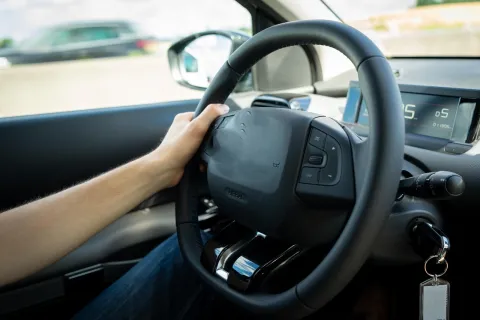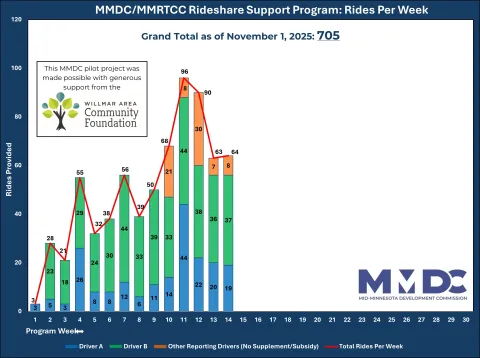
Transportation, more specifically the lack of it, can be a significant barrier to employment, especially in Greater Minnesota. To overcome this barrier, one Kandiyohi County-serving organization is taking an innovative step. With a generous grant from the Willmar Area Community Foundation, Mid-Minnesota Development Commission (MMDC) is piloting the Rideshare Support Program.
Through this program, two recruited rideshare drivers, primarily operating under Uber, though one also operates under the Lyft platform, receive a tapered weekly subsidy to support their operations. In exchange, these drivers, one of whom is fluent in both English and Spanish, must be “on duty” and provide rides at least 30 hours each week, after 2 p.m. on weekdays or anytime during weekends and holidays. While the drivers may also operate during other hours, the intent is to provide transportation-disadvantaged individuals – aging individuals, people with disabilities, and other nondrivers – with an option for getting around when the local public transit bus isn’t a viable option. In addition to helping people to get to medical appointments, run errands, and get around for leisure activities, MMDC believes rideshare has real potential to help workers and jobseekers with temporary or long-term transportation needs.
In Kandiyohi County, which includes the city of Willmar as well as other smaller communities, public transit is limited, and often unable to meet workers’ needs, especially if they work evenings or weekends. MMDC acknowledges that, for various reasons, including both safety and expense, many people cannot drive or maintain a vehicle. Others may simply need a short-term solution when their own vehicle is in the shop for repair. Missing several days of work because their car isn’t operational could put a worker’s job in jeopardy.
The weekly driver subsidy, which started at $450 per week and is reduced by $50 every few weeks, gives the engaged rideshare drivers more time to build a critical mass of local rideshare customers. While there are plenty of customers to sustain operation in urban areas, rural areas require more nurturing. Rideshare is still new to many, and it takes time to do substantial outreach.
MMDC is working to spread the rideshare word to those in need of transportation solutions. This work includes coordinating “meet-and-greet” events and informational sessions. Drivers have also participated in other community events to help community members feel more familiar and comfortable. MMDC is also exploring how third parties, such as local human service, vocational rehabilitation, or other CareerForce partners might help to fund rides for their working or job seeking clients.

Since the pilot project launched in July, two additional rideshare drivers have started operating in the area, without subsidy, and rideshare is already starting to become more normalized. As of November 1, over 700 rides have been documented. Not bad for an area that, according to one rideshare driver, used to produce only about eight rides per month.
One of Minnesota’s nine regional development commissions, MMDC is the operator of the Mid-Minnesota Regional Transportation Coordination Council (MMRTCC). Primarily funded by the U.S. and Minnesota Departments of Transportation, the MMRTCC works to identify and bridge transportation gaps throughout Kandiyohi, McLeod, Meeker, and Renville Counties. The effort leverages expertise and collaboration from various stakeholders, including transportation providers, healthcare organizations, human service agencies, and others who serve people with transportation barriers.
- Read details about the Rideshare Support Program and more on the Mid-Minnesota Development Commission website.
- Learn about resources that might be available in your part of Minnesota to help overcome barriers to employment by contacting a CareerForce location near you.

